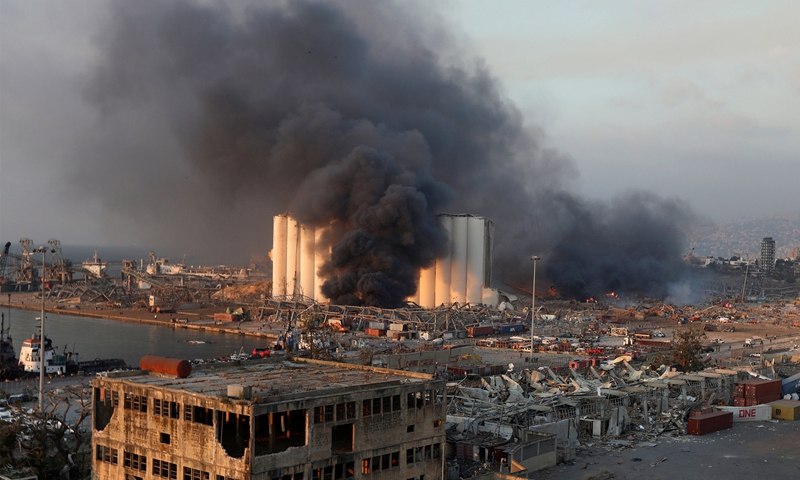China to prioritize safety inspections of ports after Beirut blast
By Leng Shumei, Cao Siqi and Chu Daye Source: Global Times Published: 2020/8/5 21:08:40

Smoke rises from an explosion site at the port of Beirut, Lebanon, Aug. 4, 2020. Photo: VCG
China on Wednesday ordered a safety inspection of ports, wharfs, chemical industrial parks, warehouses and other places which store toxic and hazardous items, after more than 100 people were killed in an explosion in Beirut, the capital of Lebanon, on Tuesday.
The announcement was made at the special video conference of the Office of Work Safety Commission of China's State Council and the country's Ministry of Emergency Management on Wednesday.
It ordered immediate inspections, and rectification of places which violate safety standards. China has a large number of ports and wharfs with dangerous chemicals, according to the meeting, noting that the Beirut sounded the alarm.
The explosion in Beirut has killed more than 100 and injured over 4,000 as of press time.
Chinese President Xi Jinping sent on Wednesday a message of condolence to his Lebanese counterpart, Michel Aoun, over the huge explosions in Beirut.
On behalf of the Chinese government and people and in his own name, Xi extended profound condolences to the victims, conveyed heartfelt sympathies to the bereaved families and the injured, and wished the injured a quick recovery.
Chinese Foreign Ministry spokesperson Wang Wenbin said at a press conference on Wednesday that China would like to offer help to Lebanon to properly handle the incident and realize national development.
The blast damaged a warship of the UN Interim Force, and Chinese peacekeepers at the UN Interim Force in Lebanon immediately organized officers and soldiers to ensure they can be dispatched immediately after receiving a rescue order, the People's Daily reported.
One Chinese was slightly injured and no Chinese was killed in the explosion in Beirut on Tuesday, the Chinese embassy in Lebanon told media.
Some people may have been slightly hurt by glass shards caused by the explosion, but most Chinese citizens are safe, The Beijing News reported Wednesday, citing an anonymous employee from the Chinese embassy in Lebanon.
The embassy issued an urgent safety warning on Wednesday to Chinese citizens in Lebanon.
The warning said the explosion happened on Tuesday, leading to massive casualties and damage to many buildings.
An investigation into the explosion is underway, the embassy said.
Wang Yingjie, secretary-general of the Pinglan Public Welfare Fund, told the Global Times on Wednesday that the fund's office in Beirut was damaged.
"The blast shattered the glass of our office. Luckily, no one was injured. We plan to temporarily evacuate to nearby towns to avoid toxic gas and other injuries. Once we're safe, we will begin rescue work," Wang said.
The fund established an office in Beirut in May 2019 to provide humanitarian assistance to Syrian refugees in and around the region.
Wang said the blast has not had a huge influence on the fund or Chinese nationals, as many of them had returned to China due to the coronavirus pandemic. However, he was worried the incident could lead to social turmoil, as the country is under huge economic pressure.
According to Wang, Chinese nationals are mostly engaged in international trade, daily supplies and tourism. Some of them are Chinese students, while others run Chinese restaurants. The fund will provide as much assistance to the victims of the explosion as possible.
The explosion at the port, a hub in the eastern Mediterranean, has caused some uncertainty to Chinese shipping companies.
Chinese merchant shipping giant COSCO Shipping Corporation confirmed with the Global Times on Wednesday that the company has two shipping lanes connected with the port, but no ship was in the harbor when the explosion happened. There were also no staff casualties.
"Our company is adjusting the shipping schedule and customer service in accordance with the port's recovery to minimize the impact of the accident," the company said in a note sent to the Global Times on Wednesday.
The explosion was likely caused by 2,700 tons of ammonium nitrate stored in a warehouse since 2014, media reported.
Lebanon's Prime Minister Hassan Diab declared Wednesday a national day of mourning.
At least 10 firefighters working for the Beirut municipality were missing after the explosion, the city's governor Marwan Abboud told media, noting that the explosion reminded him of the nuclear bombs dropped on Hiroshima and Nagasaki.
Beirut is an important port in Lebanon, and a feeder port in the Mediterranean region. It used to be a vital node from the Far East to Europe, but the port developed slowly and its operations have been greatly impacted by continuous strife, Wu Minghua, a Shanghai-based independent shipping industry analyst, told the Global Times on Wednesday.
Wu predicted that the explosion will lead to more ships turning to other ports along the Mediterranean in the second half of the year.
But it is unlikely that global trade will suffer from the explosion, due to the small scale of trade at the port in the Mediterranean region, Wu said.
Posted in: DIPLOMACY